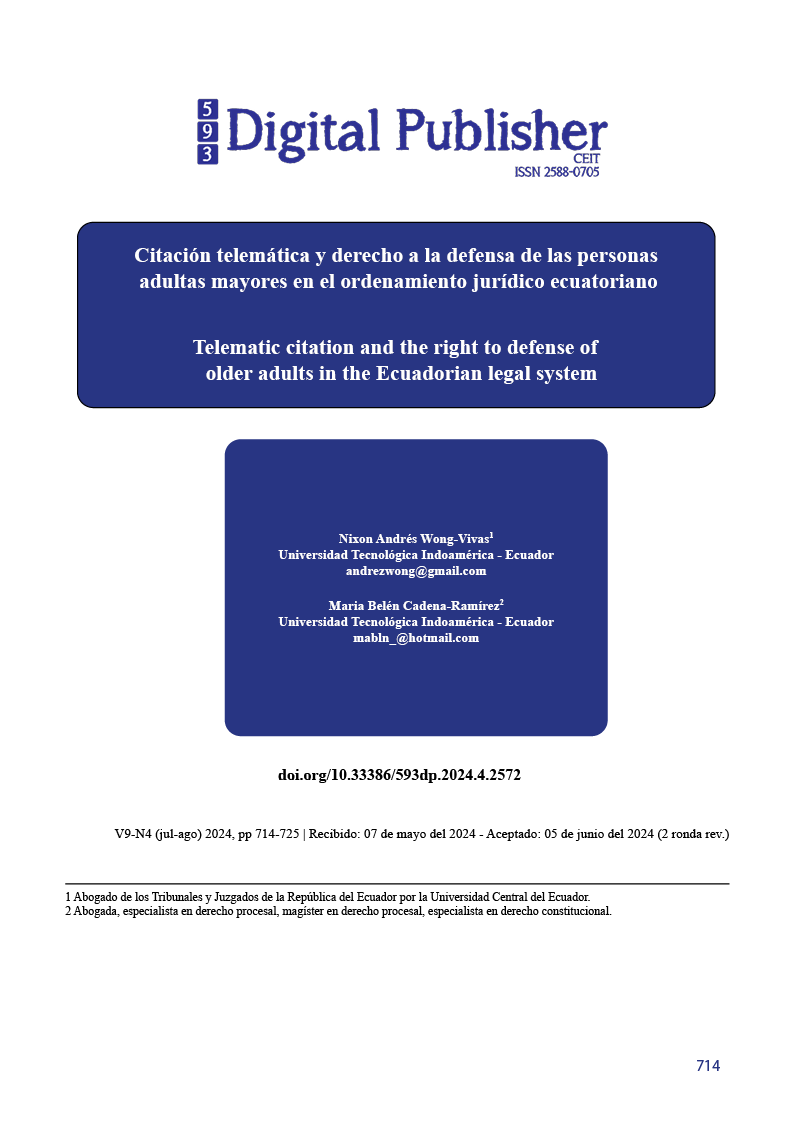Telematic citation and the right to defense of older adults in the Ecuadorian legal system
Main Article Content
Abstract
This article makes a study of constitutional rights such as the right to defense and due process in the face of electronic subpoena focused on older adults. The telematic citation is given to the reform of the General Organic Code of Processes, published by Law s/n, R.O. 245-3S, 7-II-2023, which introduces this new type of summons, the same one that entails a series of violations of the rights established in the Constitution of the Republic of Ecuador towards older adults as a priority attention group who are immersed in a judicial process.
The telematic summons establishes the construction of a citizen electronic mailbox to which the demands will be notified to natural persons. This procedure violates the rights of older adults, violating due process and the right to defense since the lack of knowledge about the development of new technologies and the establishment of personal electronic mailboxes to receive legal notifications fragments the security of allowing older adults to exercise an adequate defense due to lack of knowledge of the use of electronic means.
Downloads
Article Details

This work is licensed under a Creative Commons Attribution-NonCommercial-ShareAlike 4.0 International License.
1. Derechos de autor
Las obras que se publican en 593 Digital Publisher CEIT están sujetas a los siguientes términos:
1.1. 593 Digital Publisher CEIT, conserva los derechos patrimoniales (copyright) de las obras publicadas, favorece y permite la reutilización de las mismas bajo la licencia Licencia Creative Commons 4.0 de Reconocimiento-NoComercial-CompartirIgual 4.0, por lo cual se pueden copiar, usar, difundir, transmitir y exponer públicamente, siempre que:
1.1.a. Se cite la autoría y fuente original de su publicación (revista, editorial, URL).
1.1.b. No se usen para fines comerciales u onerosos.
1.1.c. Se mencione la existencia y especificaciones de esta licencia de uso.
References
Acuerdo Nro. MINTEL-2023-0018. (2023). Quito: Ministerio de Telecomunicaciones y de la Sociedad de la Información.
Alberto Wray Espinosa. (2000). El debido proceso en la Constitución . Quito: Iuris Dictio.
Barney, O. C. (2015). Defensa a la defensa y abogacía en México. México D.F: Intituto de Investigaciones Jurídicas.
Cabanellas, G. (2006). Diccionario Jurídico Elemental. Mexico D. F. : Heliasta .
Catena, V. M. (2010). Sobre el derecho de Defensa, Cuestiones Generales. Madrid : Teorder.
Código Orgánico General de Procesos. (2016). Quito: Asamblea Nacional.
Constitución del Ecuador. (2008). Quito: Asamblea Nacional.
Corte Constitucional del Ecuador . (2013). Sentencia No. 131-13-SEP-CC. Quito.
Cueva, L. (2013). El debido proceso. Quito: Ediciones Cueva Carrión.
Daniel Hidalgo Hurtado. (2017). El Debido Proceso. BIOLEX Revista Jurídica de Deercho UNISON URC.
Echandía, D. (2013). Teoría Genreal del Proceso. Buenos Aires: Editorial Univerdad .
Falconí, J. C. (2016). Analisis jurídico teórico-práactico del Código Orgánico Gerenral de Procesos Tomo Primero. Quitoi: Indufraf.
García, A. D. (2002). Derecho Informático. Bogotá : Leyer.
Granados, M. R. (2009). EL DERECHO COMO PRÁCTICA Y CIENCIA SOCIAL. MÁS ALLÁ DEL SILOGISMO. San José : Revista de Ciencias Sociales .
Huenchuan, S. (2018). Envejecimiento personas mayores y Agenda 2030 para el Desarrollo Sostenible. Santiago : Cepal.
Ley de Comercio Electrónico. (2022). Quito: Asamblea Nacional.
Ley Orgánica de las Peronas Adultas Mayores. (2019). Quito : Suplemento del Registro Oficial No. 484.
Rodríguez, M. A. (2008). Manual de Derecho Informático. Madrid: Aranzadi.



